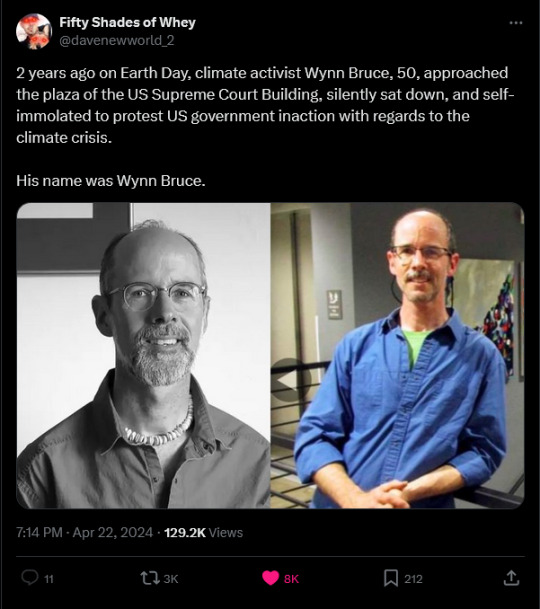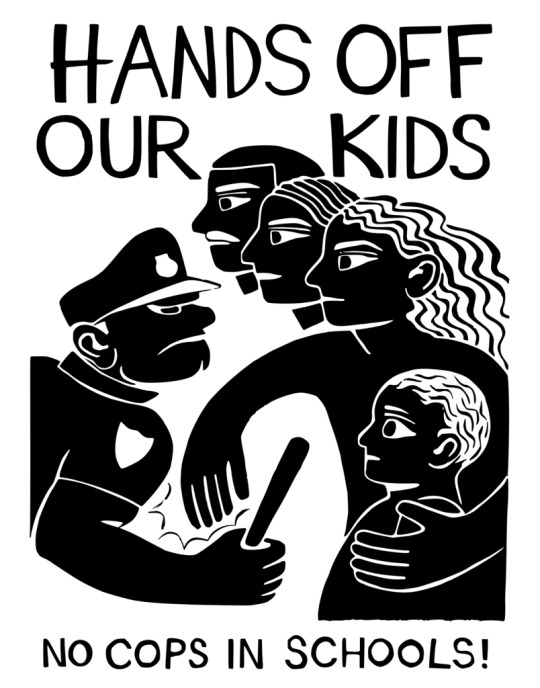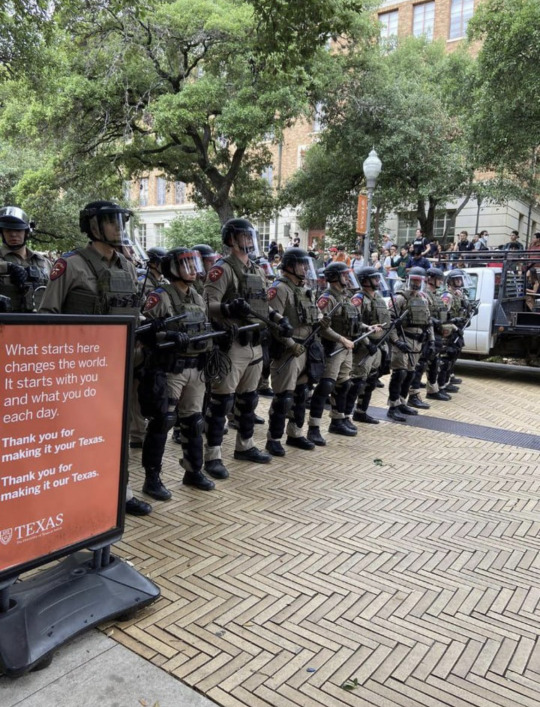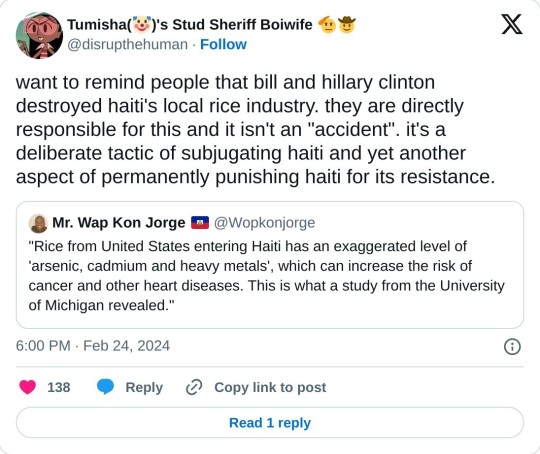#communism
Text
Of the Americans who fought in Korea or Vietnam, none were "innocent" by virtue of having been drafted. The moral choice there was to either dodge the draft, defect to the other side, or frag the guy giving orders. Anyone who chose otherwise was a criminal and a murderer. And once the draft was over and the army became volunteer-only, all the excuses vanished. Yes, there are people who were in Iraq or Afghanistan or Syria who regretted it, but regretting your crime doesn't undo it. That's just the minimum requirement for being a decent human being in the aftermath.
To everyone who says "you leftists can't go around hating on the troops, don't you want them to join the revolution?" I say "why would they join us if they couldn't handle being told the truth about the genocidal terrorist organization they volunteered for?" If their reaction upon hearing people call the US military murderers and terrorists is to deny or equivocate or rationalize their participation, then they're not yet fit to be a revolutionary. If we're trying to dismantle the imperialist warmongering empire that continues to use its might and influence to murder millions around the world that is the United States, what good is a person who balks at the notion that the troops who volunteer to pledge their lives and their loyalty in service of this empire might be complicit in its crimes?
An American soldier or veteran who is not ready to admit they were wrong will not be any more ready to join us if we lie to them and say they made no mistake in joining the US military. We only weaken our own messaging and our own position if we refuse to condemn not just the US military as an organization but all those who continue to participate in and defend its actions. The troops are not innocent.
1K notes
·
View notes
Text

Riot spotted in St Petersburg, Florida
396 notes
·
View notes
Text
the look all the blue haired communist give you when they try their “i’m a non-abled intersex trans woman suffering from a plethora of diseases” excuse to get out of labour :

Why are these people, those who do no or refuse hard or meaningful labour, the face of these economic revolutionary parties?
#socialism#communism#feminism#feminist#feminist literature#radical feminism#radical feminist theory#terfblr#trans exclusionary radical feminist#radical feminists please touch#radical feminist community#radical feminists do interact#socialist revolution#socialist politics
245 notes
·
View notes
Text

#earth day#leftism#socialism#communism#anti capitalism#anarchy#ecosystem#environment#ecology#eco#save the planet#go green#save the earth#recycle#april 22#save the bees#twitter x#save the children
163 notes
·
View notes
Text

ITS IMPORTANT!!!
THE TIKTOK BAN IS SO MUCH MORE THAN BANNING TIKTOK, IT WOULD GIVE THEM THE ABILITY TO BAN ANY SOCIAL MEDIA SITE THATS BIG ENOUGH, INCLUDING TUMBLR!!!
IT'LL GET RID OF ANY PRIVACY YOU HAVE LEFT, AND STOP A LOT OF PROGRESSIVE MOVEMENT IN ITS TRACKS. IT WILL EVEN TAKE YOUR RIGHT TO TALK ABOUT IT AWAY. IT WILL COMPLETELY VIOLATE YOUR FREEDOM OF SPEECH. IF YOU CARE ABOUT PRIVACY, PALESTINE, TUMBLR, THE INTERNET, FOR THE LOVE OF FUCK, PLEASE CALL IN AND SPREAD THIS!!!
#Kosa#fuck kosa#tiktok ban#leftist#communism#socialism#miraculous ladybug#r/196#cosplay#avatar the last airbender#pokemon#bnha#the owl house#pmd#digimon#boku no hero academia#bad internet bills#politics#palestine#vtuber#zom 100: bucket list of the dead#animorphs#dnd#pathfinder#balders gate 3#balders gate#america#watcher
233 notes
·
View notes
Text
#Syria#transfemme#sex and the city#communism#rpg#resident evil#feetish#invader zim#deeplearning#dollification#dsmp
125 notes
·
View notes
Text

Stand with students, stand with Palestine❤️🇵🇸
(Not OC)
#gaza#marxism#palestine#socialism#communism#history#politics#west bank#genocide#student#protest#boycott israel#strike for gaza#anarchism#anarchocommunism#Solidarity#south africa#current events#acab1312#cops#gaza solidarity encampment#youth#queers for palestine#lgbtq#socialist revolution#peace#news#art#poster#awareness
50 notes
·
View notes
Text

A.2.6 Why is solidarity important to anarchists?
Solidarity, or mutual aid, is a key idea of anarchism. It is the link between the individual and society, the means by which individuals can work together to meet their common interests in an environment that supports and nurtures both liberty and equality. For anarchists, mutual aid is a fundamental feature of human life, a source of both strength and happiness and a fundamental requirement for a fully human existence.
Erich Fromm, noted psychologist and socialist humanist, points out that the “human desire to experience union with others is rooted in the specific conditions of existence that characterise the human species and is one of the strongest motivations of human behaviour.” [To Be or To Have, p.107]
Therefore anarchists consider the desire to form “unions” (to use Max Stirner’s term) with other people to be a natural need. These unions, or associations, must be based on equality and individuality in order to be fully satisfying to those who join them — i.e. they must be organised in an anarchist manner, i.e. voluntary, decentralised, and non-hierarchical.
Solidarity — co-operation between individuals — is necessary for life and is far from a denial of liberty. Solidarity, observed Errico Malatesta, “is the only environment in which Man can express his personality and achieve his optimum development and enjoy the greatest possible wellbeing.” This “coming together of individuals for the wellbeing of all, and of all for the wellbeing of each,” results in “the freedom of each not being limited by, but complemented — indeed finding the necessary raison d’etre in — the freedom of others.” [Anarchy, p. 29] In other words, solidarity and co-operation means treating each other as equals, refusing to treat others as means to an end and creating relationships which support freedom for all rather than a few dominating the many. Emma Goldman reiterated this theme, noting “what wonderful results this unique force of man’s individuality has achieved when strengthened by co-operation with other individualities . .. co-operation — as opposed to internecine strife and struggle — has worked for the survival and evolution of the species… . only mutual aid and voluntary co-operation … can create the basis for a free individual and associational life.” [Red Emma Speaks, p. 118]
Solidarity means associating together as equals in order to satisfy our common interests and needs. Forms of association not based on solidarity (i.e. those based on inequality) will crush the individuality of those subjected to them. As Ret Marut points out, liberty needs solidarity, the recognition of common interests:
“The most noble, pure and true love of mankind is the love of oneself. I want to be free! I hope to be happy! I want to appreciate all the beauties of the world. But my freedom is secured only when all other people around me are free. I can only be happy when all other people around me are happy. I can only be joyful when all the people I see and meet look at the world with joy-filled eyes. And only then can I eat my fill with pure enjoyment when I have the secure knowledge that other people, too, can eat their fill as I do. And for that reason it is a question of my own contentment, only of my own self, when I rebel against every danger which threatens my freedom and my happiness…” [Ret Marut (a.k.a. B. Traven), The BrickBurner magazine quoted by Karl S. Guthke, B. Traven: The life behind the legends, pp. 133–4]
To practice solidarity means that we recognise, as in the slogan of Industrial Workers of the World, that “an injury to one is an injury to all.” Solidarity, therefore, is the means to protect individuality and liberty and so is an expression of self-interest. As Alfie Kohn points out:
“when we think about co-operation… we tend to associate the concept with fuzzy-minded idealism… This may result from confusing co-operation with altruism… Structural co-operation defies the usual egoism/altruism dichotomy. It sets things up so that by helping you I am helping myself at the same time. Even if my motive initially may have been selfish, our fates now are linked. We sink or swim together. Co-operation is a shrewd and highly successful strategy — a pragmatic choice that gets things done at work and at school even more effectively than competition does… There is also good evidence that co-operation is more conductive to psychological health and to liking one another.” [No Contest: The Case Against Competition, p. 7]
And, within a hierarchical society, solidarity is important not only because of the satisfaction it gives us, but also because it is necessary to resist those in power. Malatesta’s words are relevant here:
“the oppressed masses who have never completely resigned themselves to oppress and poverty, and who … show themselves thirsting for justice, freedom and wellbeing, are beginning to understand that they will not be able to achieve their emancipation except by union and solidarity with all the oppressed, with the exploited everywhere in the world.” [Anarchy, p. 33]
By standing together, we can increase our strength and get what we want. Eventually, by organising into groups, we can start to manage our own collective affairs together and so replace the boss once and for all. ”Unions will… multiply the individual’s means and secure his assailed property.” [Max Stirner, The Ego and Its Own, p. 258] By acting in solidarity, we can also replace the current system with one more to our liking: “in union there is strength.” [Alexander Berkman, What is Anarchism?, p. 74]
Solidarity is thus the means by which we can obtain and ensure our own freedom. We agree to work together so that we will not have to work for another. By agreeing to share with each other we increase our options so that we may enjoy more, not less. Mutual aid is in my self-interest — that is, I see that it is to my advantage to reach agreements with others based on mutual respect and social equality; for if I dominate someone, this means that the conditions exist which allow domination, and so in all probability I too will be dominated in turn.
As Max Stirner saw, solidarity is the means by which we ensure that our liberty is strengthened and defended from those in power who want to rule us: “Do you yourself count for nothing then?”, he asks. “Are you bound to let anyone do anything he wants to you? Defend yourself and no one will touch you. If millions of people are behind you, supporting you, then you are a formidable force and you will win without difficulty.” [quoted in Luigi Galleani’s The End of Anarchism?, p. 79 — different translation in The Ego and Its Own, p. 197]
Solidarity, therefore, is important to anarchists because it is the means by which liberty can be created and defended against power. Solidarity is strength and a product of our nature as social beings. However, solidarity should not be confused with “herdism,” which implies passively following a leader. In order to be effective, solidarity must be created by free people, co-operating together as equals. The “big WE” is not solidarity, although the desire for “herdism” is a product of our need for solidarity and union. It is a “solidarity” corrupted by hierarchical society, in which people are conditioned to blindly obey leaders.
#faq#anarchy faq#revolution#anarchism#daily posts#communism#anti capitalist#anti capitalism#late stage capitalism#organization#grassroots#grass roots#anarchists#libraries#leftism#social issues#economy#economics#climate change#climate crisis#climate#ecology#anarchy works#environmentalism#environment#solarpunk#anti colonialism#mutual aid#cops#police
34 notes
·
View notes
Text

This image is the deepest form of irony to me
28 notes
·
View notes
Text

This might actually be one of the hardest images I’ve ever seen
#anarchism#anarchist#anarchocommunism#praxis#communism#communist#revolution#leftism#leftist#politics
27 notes
·
View notes
Text

22 notes
·
View notes
Text
Not socialist in a “I won’t have to work” type of way but socialist in a “I’ll still be working but I won’t be worried I won’t make the rent” type of way. In a “billions won’t be hoarded by one person” type of way. In a “janitors, fast-food workers, child care workers, preschool teachers, hotel clerks, personal care and home health aides, and grocery store cashiers, will live comfortably” type of way. In a “the sick and elderly will be cared for” type of way. In a “no child should work” type of way.
#socialist#socialism#communism#anti capitalism#the belief that we won’t work under capitalism genuinely makes me so mad#like#you realize the goal of social reform is to abolish imperialism right?#there won’t be good just showing up out of nowhere without slavery and/or imperialism
86K notes
·
View notes
Text

#leftism#anti capitalism#socialism#communism#anarchy#earth day#ecosystem#eco#rewilding#environment#ecology#ecofriendly#agriculture#infrastructure#ecofashion#waste
41 notes
·
View notes
Text

21K notes
·
View notes
Text
I love you people going into "useless" fields I love you classics majors I love you cultural studies majors I love you comparative literature majors I love you film studies majors I love you near eastern religions majors I love you Greek, Latin, and Hebrew majors I love you ethnic studies I love you people going into any and all small field that isn't considered lucrative in our rotting capitalist society please never stop keeping the sacred flame of knowledge for the sake of knowledge and understanding humanity and not merely for the sake of money alive
#classics#mythology#ancient greek mythology#ancient roman mythology#comparative literature#latin#hebrew#ethnic studies#fuck capitalism#communism#i love my useless degree idc#academia#university#dark academia#Greek#philosophy#liberal arts#humanities#women and gender studies#cultural anthropology
35K notes
·
View notes
Text

Encampments for Gaza: A Brief Analysis Through My Eyes
Starting as a small sit-in in Columbia University to protest the university's ties with Israel and other Zionist organizations, the student protest movement has spread across the United States and encampments have been established at numerous universities across the country, including MIT, NYU as well as the Universities of Michigan and New Mexico.
These student movements, reminiscent of protest movements against US intervention in Viet Nam in the 60s and 70s and more recently, the BLM protests in 2020, hold massive potential to not only cause divestment from Israel's genocide in Gaza, but can act as a much greater force in the disassembly of United States imperialism and capitalism.
These encampments are pivotal in highlighting disconent among the American youth as well as the brutality and inherently oppressive nature of the American system. If these students seek to bring about real, lasting change, they should embrace a higher degree of organization, participation in community organization, self-defense, and increasing militarization within their encampment movement.
If history has taught us anything, the boot of the US government will step down on these protesters if they are not ready. They need to be ready to fight for Gaza and the people of Palestine, they need to be ready to fight for themselves and their rights, and they need to be ready to fight for a future without imperialist and capitalist greed.
#gaza#marxism#palestine#socialism#communism#history#politics#essay#blog#current events#gaza genocide#free palestine#genocide#divestment#gaza solidarity encampment#solidarity#news#anarchocommunism#anarchism#anarchist#student#youth#columbia university#new york#antifascist#acab1312#intifada#resistance#socialist revolution#leftism
23 notes
·
View notes